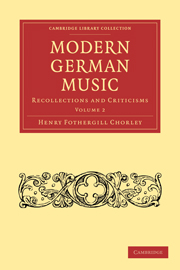Book contents
- Frontmatter
- Contents
- WEIMAR AND LEIPSIC
- DR. SPOHR'S MUSIC
- A GLANCE AT VIENNA
- MUSIC IN THE RHINE LAND
- CHAP. I Rhine Scenery
- CHAP. II The Opera at Frankfort, 1844. Cherubini's “Medea”
- CHAP. III The Beethoven Festival at Bonn, 1845
- CHAP. IV Beethoven's Music at Bonn
- CHAP. V Beethoven as an Influence
- CHAP. VI Music at Liege and Cologne, 1846
- CHAP. VII Mademoiselle Lind in Opera
- THE LAST DAYS OF MENDELSSOHN
CHAP. I - Rhine Scenery
Published online by Cambridge University Press: 07 September 2010
- Frontmatter
- Contents
- WEIMAR AND LEIPSIC
- DR. SPOHR'S MUSIC
- A GLANCE AT VIENNA
- MUSIC IN THE RHINE LAND
- CHAP. I Rhine Scenery
- CHAP. II The Opera at Frankfort, 1844. Cherubini's “Medea”
- CHAP. III The Beethoven Festival at Bonn, 1845
- CHAP. IV Beethoven's Music at Bonn
- CHAP. V Beethoven as an Influence
- CHAP. VI Music at Liege and Cologne, 1846
- CHAP. VII Mademoiselle Lind in Opera
- THE LAST DAYS OF MENDELSSOHN
Summary
Some of my most sunny musical days, have been those spent in the Rhine land.
It has now become, if not positively difficult, “uneasy” (as the Germans put it) to say a good word for the great river, and the district it traverses. Familiarity has bred contempt for the Drachenfels and Ehrenbreitstein and Loreley's rock and Bishop Hatto's tower. Yet the Rhine is not disenchanted, save to those whose exquisite dread of what is common-place and Cockney, merely proves that the poetry in their souls has a thin, second-hand existence. A Rhine steamer with its cookshop on board is a weary conveyance to an out-worn Londoner in August,–a place of humiliation to such among us as would fain keep our vulgar and vacant countrymen at home.–The Rhine hotels, with their sleepless polyglott waiters, and banging doors, and jangling bells, offer small “rest to the sole of one's mind” betwixt July and October. But those who do not treat the river as a mere highway—persons who can bear to see the floating caravanserais crowded with people. athirst for Switzerland or Italy or some place more distant and untrodden, ploughing and fuming their way up the rapid stream—and who are willing to loiter and to be left behind—will find a rich repayment in the Rhine-land wherever they choose to trace a stream up its valley, or to circuit the volcanic hills and weinbergs, which shut in the great river sometimes with too monotonous a closeness.—I know of no ruin more picturesque in shattered choir and broken cross—more solemn in its leafy seclusion at the foot of one of the Seven Hills—than the destroyed convent church at Heisterbach; within an afternoon's easy reach of Godesberg.
- Type
- Chapter
- Information
- Modern German MusicRecollections and Criticisms, pp. 211 - 218Publisher: Cambridge University PressPrint publication year: 2009First published in: 1854



